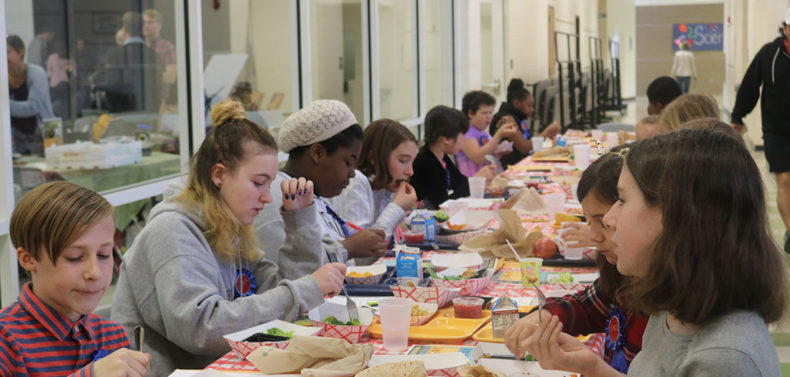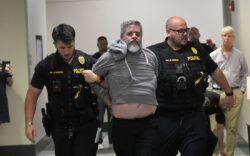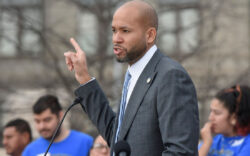Children across Georgia are cracking open the sunscreen, dusting off their flip-flops and making plans for their summer break, but school administrators have a massive task before them: planning a semester they hope will set a foundation for a return to normal.
“We’ve been learning a lot about what are the right interventions to match our students’ needs, but also what are the right professional learning opportunities for our teachers to increase their capacity and effectiveness to help our students as we come out of this,” said Fulton County Schools Chief Academic Officer Cliff Jones. “This will not be a one-year solution. This is going to be a two- to three-year proposition to help these students overcome this dramatic learning disruption.”
COVID-19 vaccines will go a long way toward helping classes return to normal, but the disease is not fully vanquished, and many children have fallen behind as the disease and economic downturn affected families, caused a spike in anxiety and shuffled classes between in-person and online.
Less Virtual Learning
By the spring, most Georgia school districts were offering in-person instruction five days a week as well as a virtual option, but class quarantines meant many students who signed up for in-person classes spent at least some time learning in front of the computer screen at home this year. For students who had or lived with someone with a serious medical condition, online school was the only way to study safely.
Some students reported enjoying the freedom of studying from home on their own schedule, but many more students felt burned out from long Zoom sessions and lonely from not seeing their friends every day. Parents were also often frustrated by trying to balance working from home and making sure their children stayed on task.
Georgia schools will be prioritizing face-to-face instruction in the fall, but many will continue to offer some form of virtual school. In Clarke County, only high schoolers will have the option to learn virtually.
“We are hearing that our parents want a face-to-face option,” said Clarke County Chief Academic Officer Brannon Gaskins. “Largely, our elementary and middle school parents want to be back face-to-face. What we’re hearing from high school is kind of split. Most of our high schoolers want to come back face-to-face, kind of depending on if their peers are coming back face-to-face.”
Clarke County recently hired a new administrator to oversee expanding the virtual program, Gaskins added. “Right now, we have a small percentage of students that take virtual school, but we expect that number will grow, and not just because of the pandemic, but we’ve seen flexibility in high school schedules through a virtual option, and we want to maintain that flexibility for students that need it,” he said.
Other districts are rolling back their virtual programs, like in Muscogee County, where students will need to qualify for virtual learning through medical exemptions. “We should plan to return in the fall at this point for full in-person with minimal virtual,” Superintendent David Lewis said at a recent board meeting. “We’re going to have some restricted provisions for virtual for some students who may be medically fragile or may have situations where they need virtual, but by and large, we are expecting a full, in-person return.”
Other districts, including Chattooga County, are canceling their virtual option altogether. In a letter to parents, Superintendent Jared Hosmer advised those who do not want their child in school to consider Georgia Virtual Schools, a state-run program for middle and high schoolers, or to consider home school.
School districts say they plan to use the technological infrastructure they adopted during the pandemic going forward, such as holding virtual classes on snow days or hosting digital rather than in-person training sessions for teachers. But not every Georgia student can connect for virtual classes. In tiny Taliaferro County, only two students chose to stay in virtual school after school doors reopened in April. While each student there has his or her own school-issued laptop, connections are often spotty in rural Georgia. “We had all the technology, but it was like having a Ferrari with no gas,” said Superintendent Allen Fort.
The district powered through, helping kids get connected when it was possible and picking up and delivering paperwork on buses when it was not, but Fort said the pandemic offered a crash course in online teaching that he hopes pays dividends once plans to expand Georgia’s rural broadband come to fruition. “This helped us to really be able to utilize technology in more advanced and innovative and imaginative ways than we ever thought we would,” he said. “I think that’s the great part that’s come for us, is that we are really fired up about not only face-to-face, but with all that we can do with the use of technology.”
Masks and Other Safety Measures
Throughout the pandemic, Gov. Brian Kemp has opposed a statewide school mask mandate, arguing that decision is best left to local districts. The governor went a step further last week when he signed an executive order banning school systems from citing the state’s emergency order to implement a mask mandate. The order stops short of preventing schools from requiring masks.
The Clayton County School District announced Tuesday it will not loosen its mask guidelines.
“While we are confident that individuals are capable of making the best decisions for themselves and their families relating to health and individual safety, Clayton County Public Schools will keep its current mask guidelines in place,” said Superintendent Morcease J. Beasley in a statement. “We realize that the pandemic is not over and our responsibility is to the safety of our employees, students and families of Clayton County.”
According to the district website, Clayton County students and staff are required to wear masks when social distancing is not possible.
The Centers for Disease Control and Prevention have said it is safe for vaccinated people to gather indoors without masks in most cases, though vaccines are not yet available for children under 12. Nevertheless, many schools that began the year with mask mandates were already planning to make masks optional.
In Fulton County, where 80% of employees have been vaccinated, Superintendent Mike Looney announced plans to go mask-optional May 21. “As the CDC and health officials have changed their guidance, we’ve reacted in a prudent and safe manner, and that’s why we made the decision that we did, and I think a lot of that has to do with vaccinations,” Jones said. In Clarke County, masks will be “strongly encouraged” but not mandatory this August.
Schools across the state implemented new measures intended to stop the spread of airborne diseases like COVID-19 and other bugs that are more common in crowded school buildings, often using federal grant money. Clarke County’s new safety measures included installing hand sanitizing stations in all schools, replacing drinking fountains with water bottle refill stations and upgrading school ventilation systems.
Good sanitation practices will remain a high priority, Gaskins said. Teachers will encourage children to wash their hands often, cover their mouths and stay home when they are not feeling well, but later in the fall, a new line could be added to the refrain: “Get your vaccine.”
Districts across the state held teacher vaccination events after education workers became eligible for the vaccine in March, with some districts moving classes online for a few days to give teachers time for their appointments. Schools could host similar events when children are approved to be inoculated.
“As the state rolls down the age of students that are able to get vaccinated, we’re going to provide vaccination clinics for our students,” Gaskins said. “Hopefully, we’ll get a majority of our students vaccinated, and we won’t have to have as stringent social distancing guidelines, but we will still keep those mitigation efforts because those are just good practices.”
Young children who are otherwise healthy have a low risk of serious complications from COVID-19, but medical experts say vaccinating them will be important to stop them from spreading it to others and to help attain herd immunity.
Vaccine producers are conducting clinical trials on children as young as 6 months. Pfizer CEO Albert Bourla told investors he expects children 2 and older could become eligible in September, with younger children to follow.
This article originally appeared in the Georgia Recorder.
Like what you just read? Support Flagpole by making a donation today. Every dollar you give helps fund our ongoing mission to provide Athens with quality, independent journalism.










